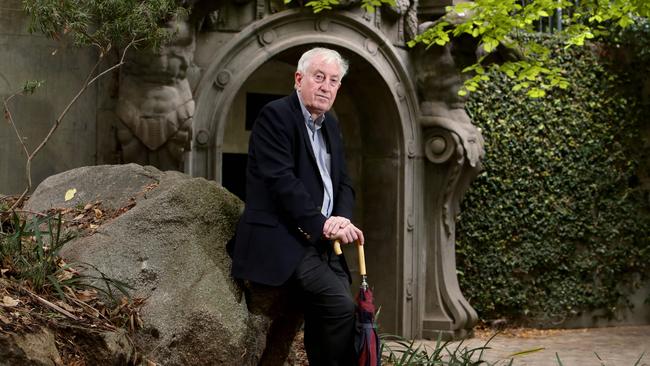Peter Doherty’s Knowledge Wars a pressing prescription for the planet
In The Knowledge Wars, Peter Doherty implores us to think about the evidence science presents and make informed decisions.

Peter Doherty is angry. The Australian Nobel laureate for medicine rails in his new book, The Knowledge Wars, against vested interests, and mining and pharmaceutical companies in particular. He is incensed that big business can wield its power to warp the understanding of science and undermine the Enlightenment traditions on which modern society has been built.
The Knowledge Wars is not just a polemic. It is designed to support Doherty’s call to us all to think about the evidence science puts before us and to make informed decisions. Three appendices offer tips on how to establish the credentials of scientists and where to find their work. A fourth demystifies the term peer review.
Doherty’s central piece of advice is to take note of scientists who are still active in their field and up-to-date with the latest discoveries and refinements in knowledge. His own expertise, in immunology, shines through in the book but he does not refrain from proffering his views on broader matters of science and democracy.
He is upfront about his position on climate change: anthropogenic climate change is dangerous. We need to act now to achieve dramatic reductions in greenhouse gas emissions. While acknowledging he is no expert on nuclear energy, he suggests nuclear fusion offers a light at the end of the clean power quest tunnel.
Sometimes Doherty’s language is intemperate. This book will not win over the climate-change deniers and the “corrupt dissembling and self-serving power elites”. Yet Doherty tries to show why even those who don’t accept the reality of global warming should act. He argues we must treat the planet like a patient, where a medical intervention, however unpleasant and costly, is better than the alternative: death. It is time to move from diagnosis to prevention.
Doherty wants urgent action. He is calling, separately, for a global moratorium on new coalmines, leading the list of signatories, few of whom are climate scientists, in an open letter to French President Francois Hollande and world leaders to put coal exports on the agenda of the Paris climate summit this month.
Doherty starts with Francis Bacon, the 16th-century philosopher and politician who declared that knowledge was power. Bacon’s seminal contribution was to move from the art of deduction — reasoning from what we do know — to the inductive method: basic observation to understand what we do not know. As Doherty traces the explosion of science that led to the technological superiority of the West, he reveals himself to be a feminist, applauding strong women from Elizabeth I to Angela Merkel, as well as a pluralist and a democrat. These historical chapters are fascinating.
We learn that science is an accumulation of knowledge, which is subject to critique and re-examination. There is no infallibility in science. Nor are all scientists saints. One chapter explicitly addresses fraud. Doherty asserts there is no place for faceless men or women in science. He also sees the need for dedicated science communicators and suggests where to find good syntheses of complex matters, such as in the news section of the journal Nature.
In the latter part of the book, Doherty tackles big questions: the competition between power, greed and evidence; faith and reality; risk. The progress science has made possible has nurtured inequality. A more polarised society is bombarded with slogans. Respect for competing analyses and ideas is trumped by the politicians’ deliberate ignorance of inconvenient truths.
Doherty also has a warning for scientists “not to come across as self-righteous members of some infallible self-appointed secular priesthood … when they don’t know the answer, or there is reasonable doubt, they should say so loud and clear”. He believes nature has the final say, but he does acknowledge that with half the world embracing some kind of religious faith, “we are not going to get very far with an issue like climate change if they don’t join the journey”. That requires tolerance of religious belief and for all to draw on the lessons inherent in the Abrahamic religions to be compassionate and responsible: “Think, duty of care, not doctrinaire!”
Science can have unintended consequences. The industrial revolution displaced workers and fostered our reliance on fossil fuels. So we need to find consider the social effects of scientific intervention and weigh the pros and cons. Faced with the evidence, there will still be difficult decisions to make. Doherty thinks that, despite the risks, nuclear power and genetically modified foods represent the lesser of two evils when it comes to fuelling and feeding the world under increasingly hostile and unpredictable climatic conditions.
Doherty’s lament is that it is not possible at the moment to have a sensible public debate about these matters. His intent is to foster our ability to have the discussion and start acting to protect the planet. Whatever you think about climate change you will learn lots from this scientist about how to weigh the evidence and reach an informed opinion.
Francesca Beddie is a historian by training. She managed the research program at the National Centre for Vocational Education Research from 2007 to 2012.
The Knowledge Wars
By Peter Doherty
Melbourne University Press, 226pp, $29.99



To join the conversation, please log in. Don't have an account? Register
Join the conversation, you are commenting as Logout